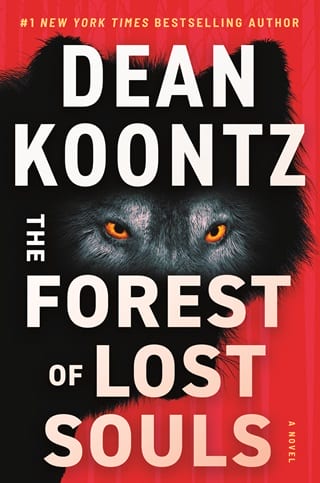28 LOVE NOTE
28
LOVE NOTE
Now, nine months after her visit with Morgan Slyke, Vida has burned the photo of Belden Bead that Deputy Nash Deacon left to torment her. She has thrown away Deacon's gift of red roses and disposed of his toothbrush and toothpaste. Having also braced the front and back doors with two-by-fours to defeat his police lock-release device, Vida takes a hot shower.
After the shampoo rinses from her hair, as steam fogs the glass of the stall and clouds the air, she's quickly overcome by a feeling that she usually must concentrate for some time to achieve, by a perception that she is liberated from the tyranny of self. Perhaps this is not merely a feeling or perception, but a true condition; she isn't interested in analyzing the moment, only in the experience of it. She dwells neither in the past nor in the future, assailed neither by memories nor by expectations. Awareness of her body—its current aches, its potential for pleasure—recedes from her. She does not think, but is thought; she does not know, but is known. She is the rushing water and the susurrant sound of it. She is the heat of the water and the steam. She waits as patiently as she has at times waited for wolves, although in this instance she is awaiting something greater for which she has no image, waits without either hope or foreboding. When she becomes aware of her hair slick against her neck, the contours of her body as the flow of water shapes it, and the residual fragrance of soap, she has submitted again to the tyranny of self. Although she has arrived at no new comprehension of herself or of the world as she's known it, she's no longer weary.
She dresses for the evening. In the library, from her uncle's collection of vinyl recordings, she selects Mozart's Piano Concerto no. 23 in A Major, K. 488. For a minute or so, she stands very still, listening to the opening movement. No matter how often she hears this music, it inspires a soaring optimism.
In the kitchen, she goes to the refrigerator to get the bottle of iced tea that she'd wanted earlier, before she found the roses and the photo of Belden Bead and been distracted by the need to dispose of them. The previous day, she'd baked an egg-custard pie but hadn't cut it. She'd intended to have a slice for dessert this evening. The pie has been violated. Nash Deacon has not simply cut a piece; he's treated the entire pie as if she prepared it just for him, digging into it here and there, consuming what he wished, returning it to the fridge with his dirty fork. Beside the pie lies an envelope.
With Rubenstein's performance of K. 488 filling this small house, the base emotion of anger in all its gradations eludes her. She is instead filled with steely resolve and courage that are more in the spirit of the music.
She uses a spatula to scrape the remaining pie into the trash bag to which she'd consigned the roses. After washing the baking pan and the fork, drying them, and putting them away, she sits at the table with the message he left while she was at the placer mine.
The envelope isn't sealed. From it, Vida extracts a sheet of paper, which she unfolds. Apparently, he wrote it on his computer, but he won't have saved the document. To a court, it proves neither intent nor the writer's identity. He has invited himself to dinner.
Dear One,
I am so looking forward to a home-cooked
dinner tomorrow evening at six o'clock. I
have no special requests when it comes to
the menu. I'm sure whatever you prepare
will be as perfect as you are. I ask only
that, of your two dresses, you wear the
white one. Our mutual friend, rest his
soul, once saw you in the black dress
and said you were ravishing, but the
white one is more in harmony with this
happy occasion. Love and kisses.
She had worn the black dress to the cemetery when José Nochelobo was interred. She doubted that Belden Bead—"our mutual friend"—had been at the service.
Using the butane match, she burns the letter and envelope in the sink and washes the ashes down the drain.
She ties shut the plastic bag containing the roses and the egg-custard pie and carries it to the trash can in the back building, for conveyance to the county dump on her weekly visit.
On this eventful Wednesday, perhaps forty minutes of light remains before the white shoals of high clouds will be alchemized into bright coral reefs and then washed into night. Returning to the house, she pauses to watch a golden eagle—identifiable by a seven-foot wingspan, feather patterns, and golden nape—as the bird glides effortlessly above the meadow, a beautiful and graceful presence even as it is a terror to every creature that it hunts.
In the house once more, Vida inserts the two-by-four in the brackets flanking the back door. She replays Mozart's K. 488.
She opens a bottle of cabernet and pours a glass. Fills a pot with water and puts it on the cooktop to bring it to a boil. Opens a package of fettuccini. Takes a container of homemade Bolognese sauce from the freezer and puts it in the countertop microwave to thaw. She lights two candles in cut-glass cups.
As the water is heating and the Bolognese is growing soft, she sits at the table, sipping her wine and listening to the music and thinking about Nash Deacon.
Tomorrow evening should be interesting.
 Fullepub
Fullepub 



